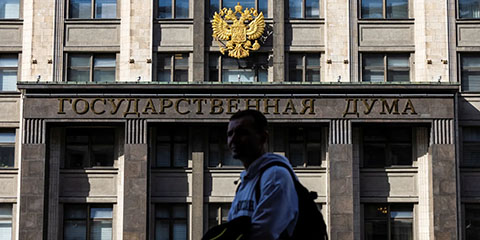Russia gearing up to prosecute internet users for searching 'extremist’ content
JournalismPakistan.com | Published: 21 July 2025 | CPJ News Alert
Join our WhatsApp channel
The Russian State Duma is considering a bill that fines users for searching extremist content online. This measure, if enacted, would further restrict media access and freedom of information.Summary
BERLIN—The Committee to Protect Journalists is alarmed by a bill under consideration in the Russian State Duma that would introduce fines for accessing or searching for “extremist” online content, threatening to further restrict press freedom and access to information.
The bill, which passed its second reading on July 17, 2025, is the “most serious step in censorship and the fight against dissent since 2022,” when lawmakers introduced penalties of up to 15 years in prison for disseminating “fake” news about the Russian army, according to the online independent news outlet The Bell. If lawmakers pass the bill and President Vladimir Putin signs it into law, it would take effect on September 1.
“Punishing people for seeking information online is a direct barrier to the free flow of information and an assault on access to independent news,” said CPJ Europe and Central Asia Senior Researcher Anna Brakha. “This vaguely worded, fast-tracked bill shows a clear disregard for open debate and create an even more repressive environment for the media and the public.”
The bill provides for fines from 3,000 to 5,000 rubles (USD$38 to USD$64) for accessing or searching content that is either included in Russia’s federal list of extremist materials or that calls for or justifies extremist activities.
Russian authorities maintain a list of over 5,400 banned “extremist” materials, including books, religious texts, songs, and films. To date, while independent media have been widely branded as undesirable and foreign agents, none have been labeled as extremist.
“Nothing prevents the authorities from declaring media outlets ‘extremists’ — which will allow them to effectively ban reading such publications,” independent media outlet Meduza said, calling the bill a step toward the “criminalization of reading.”
A representative from digital rights group Setevye Svobody, who spoke to CPJ on condition of anonymity for fear of reprisal, told CPJ he expects “the most massive example of chilling effect in the history” of the Russian internet.
Fines for reading online articles featuring so-called extremist content “will make tens of millions of users prefer to unsubscribe from the channels and stop visiting sites with information of any unofficial nature,” the representative said.
CPJ emailed the State Duma’s press service but did not immediately receive a reply.
Photo caption: The Russian State Duma is considering a bill that would introduce fines for accessing or searching for “extremist” online content. (Reuters)
KEY POINTS:
- Bill proposes fines for accessing extremist online content.
- Penalties range from 3,000 to 5,000 rubles.
- Over 5,400 materials are already banned in Russia.
- The law could deter millions from seeking independent news.
- Critics warn it marks a significant step in censorship efforts.

























